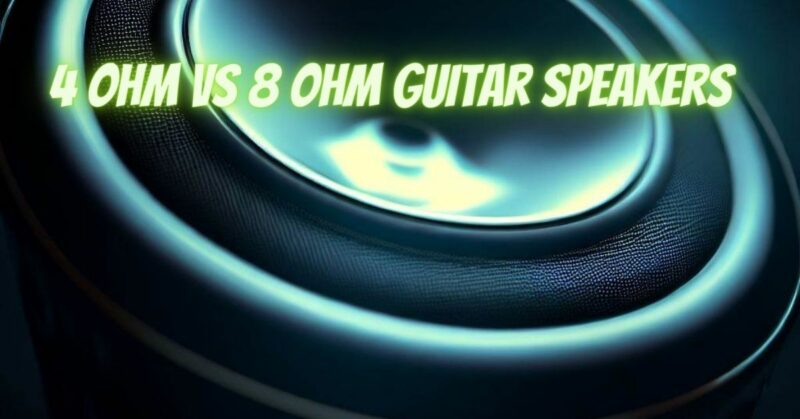In the world of guitar amplification, the choice of speakers plays a significant role in shaping your guitar tone. Among the considerations when selecting speakers, one crucial factor is the speaker’s impedance, often measured in ohms (Ω). Two common options are 4 ohm and 8 ohm guitar speakers. Each impedance offers distinct tonal characteristics, power handling capabilities, and compatibility with amplifiers. In this article, we will delve into the differences between 4 ohm and 8 ohm guitar speakers, guiding you towards the optimal choice for your sonic aspirations.
Understanding Speaker Impedance
Speaker impedance refers to the resistance a speaker offers to the flow of electrical current from the amplifier. It is a key factor in determining how the speaker interacts with the amplifier and how much power is delivered to the speaker.
Differentiating 4 Ohm and 8 Ohm Guitar Speakers
Let’s explore the differences between 4 ohm and 8 ohm guitar speakers:
- Power Handling: 4 Ohm Speakers: Generally, 4 ohm speakers can handle more power than their 8 ohm counterparts. This higher power handling capacity allows for greater volume and potential headroom.
8 Ohm Speakers: While 8 ohm speakers may have lower power handling compared to 4 ohm speakers, they can still handle substantial power and are suitable for most playing situations.
- Amplifier Compatibility: 4 Ohm Speakers: Some amplifiers are designed to deliver maximum power output at 4 ohms. If you’re using such an amplifier, 4 ohm speakers are ideal for harnessing the amp’s full potential.
8 Ohm Speakers: 8 ohm speakers are generally more versatile and can be used with a wider range of amplifiers without causing issues related to power mismatch.
- Tonal Characteristics: 4 Ohm Speakers: The lower impedance of 4 ohm speakers can result in increased power transfer and potentially more pronounced low-end response. This can lead to a fuller and more impactful bottom end.
8 Ohm Speakers: 8 ohm speakers might yield a slightly tighter low-end response and a more balanced overall tonal spectrum. They can offer a nuanced tonal palette suitable for various musical genres.
- Multiple Speaker Configurations: 4 Ohm Speakers: If you’re planning to use multiple speakers in parallel, 4 ohm speakers are often easier to configure without causing impedance-related issues.
8 Ohm Speakers: If you’re connecting multiple speakers in series or want greater flexibility in connecting different cabinets, 8 ohm speakers are more adaptable.
Choosing Between 4 Ohm and 8 Ohm Guitar Speakers
Selecting between 4 ohm and 8 ohm guitar speakers depends on your musical objectives, equipment compatibility, and tonal preferences:
- Power Demands: If you require maximum power and headroom, especially for high-energy performances, 4 ohm speakers can provide the required power transfer.
- Amplifier Considerations: If your amplifier is optimized for 4 ohm output, using 4 ohm speakers is advantageous for utilizing the amp’s design features.
- Tonal Goals: If you seek a robust and weighty low end, 4 ohm speakers might be more suitable. For a balanced and nuanced tonal response, 8 ohm speakers can deliver.
- Flexibility: If you plan to use various amplifiers or configurations, 8 ohm speakers offer greater flexibility without compromising performance.
The choice between 4 ohm and 8 ohm guitar speakers revolves around a balance of power handling, tonal preferences, and amplifier compatibility. Both options have their strengths, and the ideal choice depends on your musical style, equipment setup, and sonic aspirations. By understanding the distinctions between these two impedance options and how they interact with your amplifier, you can make an informed decision that enhances your guitar playing experience and allows you to craft the perfect tone with precision and impact.


